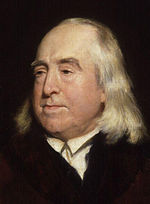Portal:Philosophy/Selected philosopher/10

Jeremy Bentham (IPA: ['benθəm]) (February 15, 1748 – June 6, 1832) was an English gentleman, jurist, philosopher, and legal and social reformer. He is best known as an early advocate of utilitarianism and animal rights.
Bentham was one of the most influential (classical) liberals, partially through his writings but particularly through his students all around the world, including James Mill, who was his secretary, his son John Stuart Mill, and several political leaders (and Robert Owen, who later became the founder of socialism). He is believed to be the innovator of classical liberalism, a term first coined in the 19th century.
He argued in favor of individual and economic freedom, including the separation of church and state, freedom of expression, equal rights for women, animal rights, the end of slavery, the abolition of physical punishment (including that of children), the right to divorce, free trade, and no restrictions on interest. But, he was not a libertarian, and supported inheritance tax, restrictions on monopoly power, pensions, and health insurance.
Bentham was born in Spitalfields, London, into a wealthy Tory family. He was a child prodigy and was found as a toddler sitting at his father's desk reading a multi-volume history of England. He began his study of Latin at the age of three.
He went to Westminster School, and in 1760 his father sent him to Queen's College, Oxford, where he took his Bachelor's degree in 1763 and his Master's degree in 1766. He trained as a lawyer and was called to the bar in 1769. He became deeply frustrated with the complexity of the English legal code, which he termed the "Demon of Chicane".
